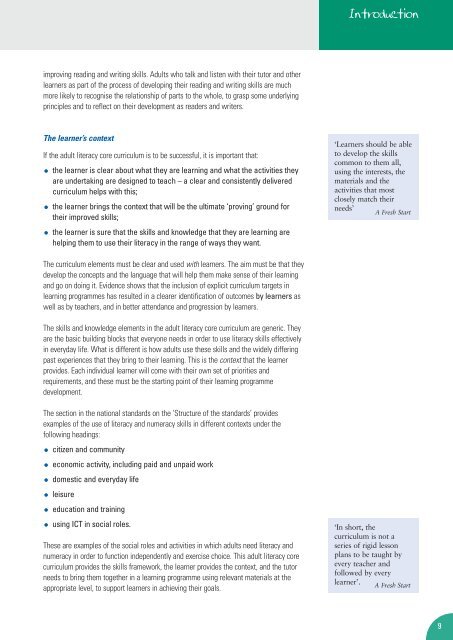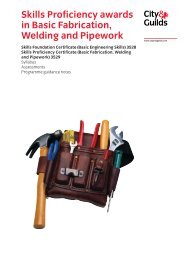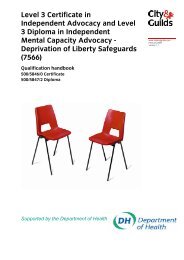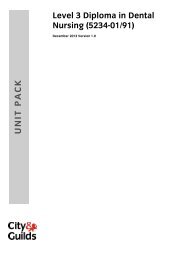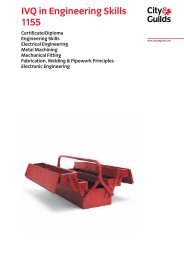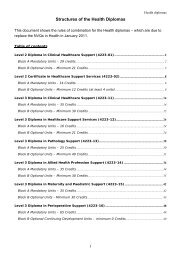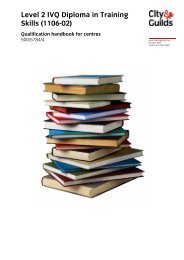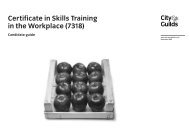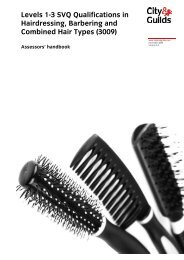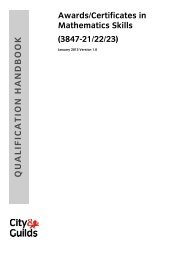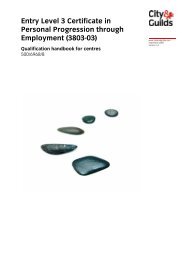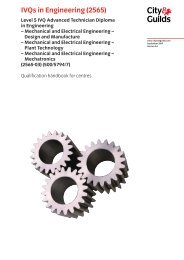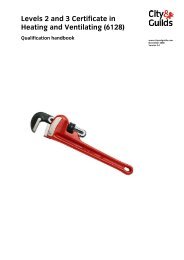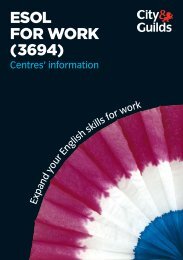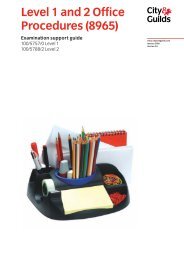Adult Literacy Core Curriculum - Nationally developed Skills for Life ...
Adult Literacy Core Curriculum - Nationally developed Skills for Life ...
Adult Literacy Core Curriculum - Nationally developed Skills for Life ...
Create successful ePaper yourself
Turn your PDF publications into a flip-book with our unique Google optimized e-Paper software.
improving reading and writing skills. <strong>Adult</strong>s who talk and listen with their tutor and other<br />
learners as part of the process of developing their reading and writing skills are much<br />
more likely to recognise the relationship of parts to the whole, to grasp some underlying<br />
principles and to reflect on their development as readers and writers.<br />
The learner’s context<br />
If the adult literacy core curriculum is to be successful, it is important that:<br />
• the learner is clear about what they are learning and what the activities they<br />
are undertaking are designed to teach – a clear and consistently delivered<br />
curriculum helps with this;<br />
• the learner brings the context that will be the ultimate ‘proving’ ground <strong>for</strong><br />
their improved skills;<br />
• the learner is sure that the skills and knowledge that they are learning are<br />
helping them to use their literacy in the range of ways they want.<br />
The curriculum elements must be clear and used with learners. The aim must be that they<br />
develop the concepts and the language that will help them make sense of their learning<br />
and go on doing it. Evidence shows that the inclusion of explicit curriculum targets in<br />
learning programmes has resulted in a clearer identification of outcomes by learners as<br />
well as by teachers, and in better attendance and progression by learners.<br />
The skills and knowledge elements in the adult literacy core curriculum are generic. They<br />
are the basic building blocks that everyone needs in order to use literacy skills effectively<br />
in everyday life. What is different is how adults use these skills and the widely differing<br />
past experiences that they bring to their learning. This is the context that the learner<br />
provides. Each individual learner will come with their own set of priorities and<br />
requirements, and these must be the starting point of their learning programme<br />
development.<br />
The section in the national standards on the ‘Structure of the standards’ provides<br />
examples of the use of literacy and numeracy skills in different contexts under the<br />
following headings:<br />
• citizen and community<br />
• economic activity, including paid and unpaid work<br />
• domestic and everyday life<br />
• leisure<br />
• education and training<br />
• using ICT in social roles.<br />
These are examples of the social roles and activities in which adults need literacy and<br />
numeracy in order to function independently and exercise choice. This adult literacy core<br />
curriculum provides the skills framework, the learner provides the context, and the tutor<br />
needs to bring them together in a learning programme using relevant materials at the<br />
appropriate level, to support learners in achieving their goals.<br />
Introduction<br />
‘Learners should be able<br />
to develop the skills<br />
common to them all,<br />
using the interests, the<br />
materials and the<br />
activities that most<br />
closely match their<br />
needs’<br />
A Fresh Start<br />
‘In short, the<br />
curriculum is not a<br />
series of rigid lesson<br />
plans to be taught by<br />
every teacher and<br />
followed by every<br />
learner’. A Fresh Start<br />
9


